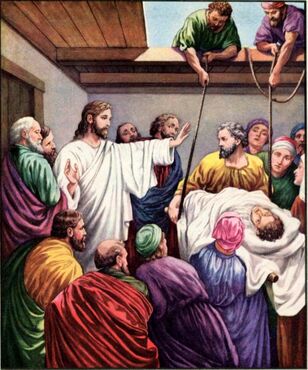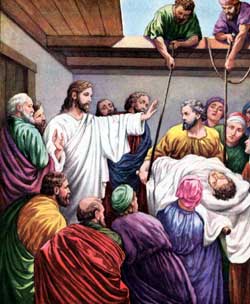Many, indeed, blaspheme that which they know not; for example those who, not belonging to our holy religion, and misled by prejudice and false teachers, misrepresent Catholic Doctrine, mock at the ceremonies of the Church, or speak disrespectfully of our Blessed Lady, or the saints, or the holy Sacraments ; but there are others, alas ! Catholics in name, who blaspheme that which they do know, by murmuring against the Justice or Providence of God, jesting about holy things, or mocking at the ministers of the Church.
You can easily understand how heinous this crime is in the sight of God. In the Old Law the blasphemer was, by the command of God Himself, sentenced to death, and stoned in sight of all the people, and in the laws of many Christian nations we find the severest punishments enacted against this crime, as, for example, in the laws of St. Louis, king of France, who ordered the tongue of the blasphemer to be pierced with a red-hot iron. Many instances are likewise recorded, in which God took it upon Himself at once to avenge His own honor, and struck the blasphemer dead in the very act of insulting Him.
Some years ago the town of Nottingham was visited by a most awful thunderstorm, the effects of which were most disastrous. The lower part of the town was flooded, and the poorer classes, who inhabited cellars, as well as many shopkeepers, suffered severely. Among those who sought shelter from the pitiless storm in the Milton's Head public-house, was a young man, a lace-maker by trade. For some time he amused himself with ridiculing the fears of the people, but his language, which was from the first light and unbecoming, became at last impious and profane. He used the Holy Name of God in the most blasphemous manner, and, with bitter oaths, expressed a wish that a thunderbolt might come down and strike his companions blind. Then raising himself, he looked through the skylight over the room in which they were sitting and, with profane gestures, defied the lightning. At that moment a vivid flash entered the room, and in an instant he was lying speechless on the floor. He was taken up by the trembling bystanders, none of whom were injured, and laid upon a couch. The first words he uttered on recovering his speech were: "God forgive me!" He had become blind.
God is blasphemed when we wish Him evil, or when we curse creatures, in so far as they are God's works. He who wishes that there was no God, or that He had not the power to punish the wicked, is guilty of the most horrid blasphemy. He who curses men, cattle, or anything else, such as the weather, is guilty of blasphemy,' according to St. Thomas of Aquin, since these are creatures or works of God; for dishonoring that which God has made is in fact dishonoring God Himself. But God can be blasphemed not only with words, but also with signs and gestures; when a man, for instance, full of rage, raises his clenched hands towards heaven, gnashes his teeth, spits upon holy things, as the soldiers did when they spat upon Jesus,' bent their knees before Him and in derision saluted Him as their king.
Children, this sin can also be committed in thought, when we voluntarily think something of God or His saints which is to their dishonor. Persons who are troubled with involuntary blasphemous thoughts must not allow themselves to be disquieted in their devotion. They should often say "Glory be to the Father, and to the Son, and to the Holy Ghost."
A very holy man left his cell in the desert to visit a sick friend of his youth who dwelt in Alexandria, and who wished to see him before he died. Most of the inhabitants of that city were pagans, who hated the Christian religion. As soon, therefore, as he entered, they knew by his dress that he was a Christian hermit, and began to mock him. Some carried their hatred so far as to strike him, and to abuse him in other ways. But the good man passed on without uttering a word of complaint, and bore all patiently for the love of God. Some of them cried after him in mockery : "Did Jesus Christ ever work a miracle?"
A man who was passing and who was a Christian said: "Yes, Jesus Christ did work many miracles; but even if He had not wrought any, the conduct of this holy man is enough to prove the truth of the Christian religion. What greater miracle could you desire to see? You have insulted and abused the good man because he is a disciple of Jesus Christ, and yet he has borne it all without murmur." These words silenced the people : they were ashamed of what they had done. And some of them, touched by the meekness of the good monk, were led to believe in God and to renounce forever paganism.
Children, by blasphemy God is attacked personally, and His honor violated. One who offends a king personally, commits a greater crime than if he transgresses one of his laws, so the blasphemer commits a far greater sin than some sinner who sins not immediately against God, but only against His law. Now if a man dares to insult and blaspheme God, whom the Cherubim and Seraphim adore with the most profound veneration, must it not be a horrible sin? If a Catholic who is a member of the true Church of God, curses God despite of all graces and evidences of His love, instead of praising and glorifying Him, is it not the most atrocious crime? Very sad to say that even some children, who scarcely know how to make the Sign of the Cross, know how to give themselves to the devil ; they learn how to curse sooner than to pray. Oh, that parents would carefully guard against cursing and blaspheming, so as not to give scandal to their children.
My dear boys and girls, I beg of you avoid the company of blasphemers, they are living devils. Furthermore, consider what you would have to reveal before the throne of God, when you must give an account of every idle word. Let the divine praises be constantly on your lips : "Blessed be God, blessed be His Holy Name."
Source: Story Sermonettes for the Children's Mass, Imprimatur 1921




 RSS Feed
RSS Feed